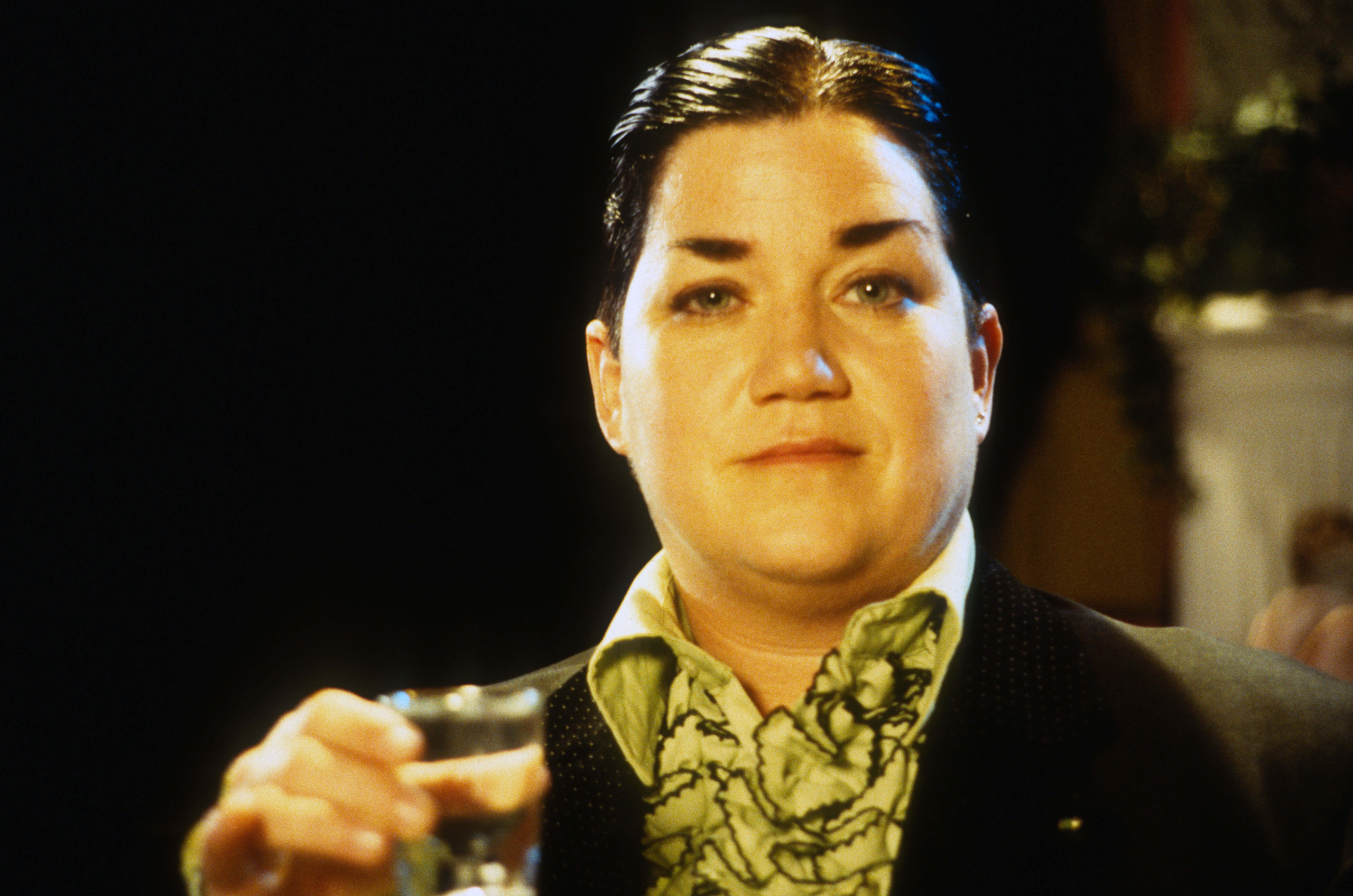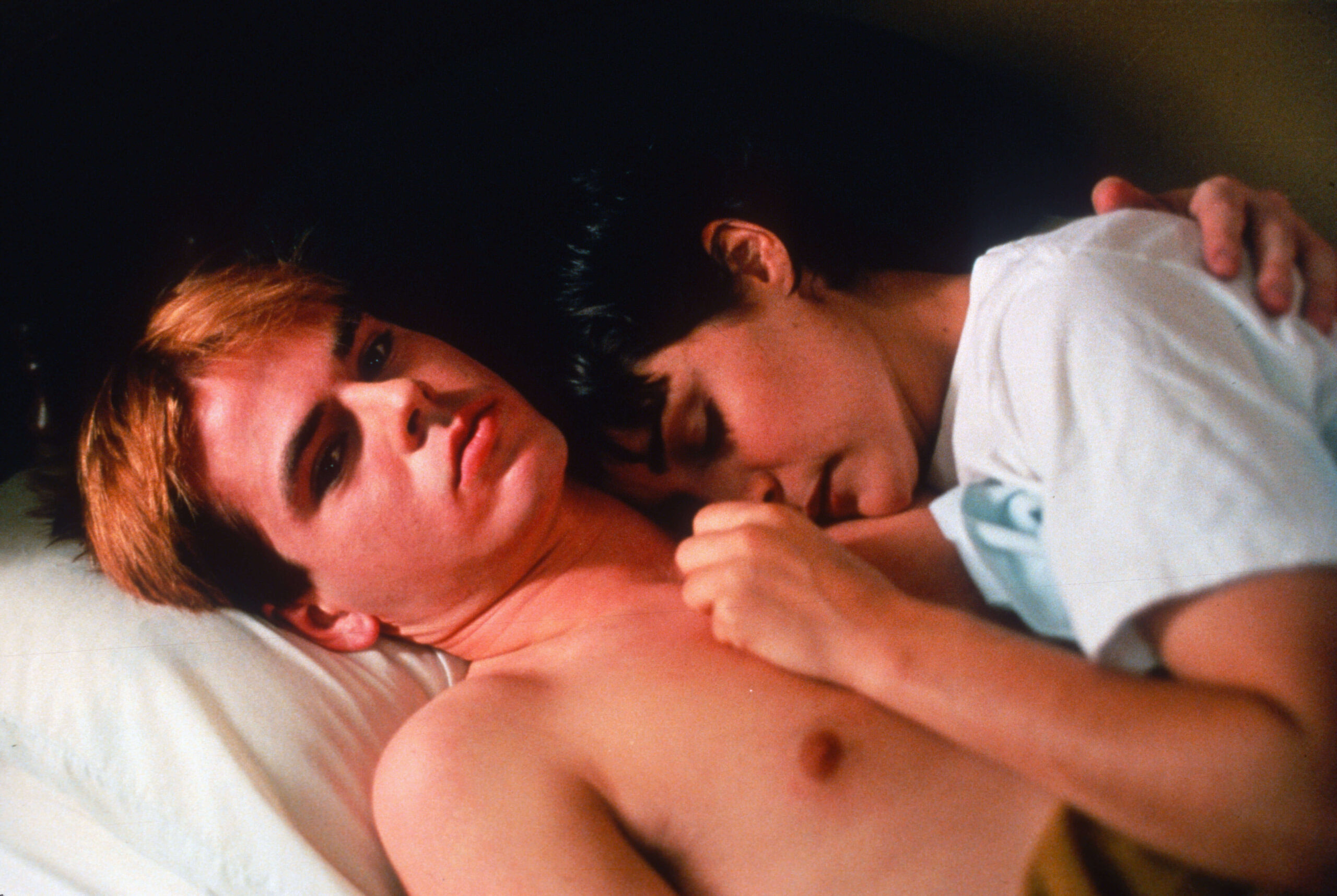David Moreton’s 1998 film, Edge of Seventeen, opens like a familiar coming-of-age movie. Written by (and drawn from the life of) screenwriter Todd Stephens, it follows Eric (Chris Stafford), an awkward, gangly white boy, and his best friend Maggie (Tina Holmes), as they end their 1984 junior school year and launch themselves into the promise of summer. Fuelled by a car-ride lip sync to a cassette tape of Toni Basil’s “Mickey,” the pair begin their summer working at an amusement park restaurant where everything—the food, the walls, the uniforms—seems to be some shade of brown. But the performatively saccharine customer service voice of butch lesbian Angie, played by Lea DeLaria, hints that there is something beyond what we see on the surface.
The coming-out film, recently added to Netflix in the United States, is a story that’s been told before. But as DeLaria remembers in a phone call with Xtra over the summer, the complex friendships and portrayal of formative young queer experiences are what make the film a classic. When Angie first meets Eric and Maggie, she teasingly asks if Eric is Maggie’s boyfriend. Maggie laughs with embarrassment while Eric looks like he’s forgotten how to speak. It’s a short scene that establishes Eric’s conflict throughout the movie: The friction between the straight world he grew up in and the gay world he’s about to enter.
Coming out is a familiar journey for queers: It’s an odyssey between two worlds, a movement from the environment we’ve always known into a new life that has its own beauty and trauma, where a transformation is bound to occur. Over the course of the film, Eric goes through a physical transformation as he experiments with ’80s fashion and embarks on a familiar white gay boy hair journey (an attempt to bleach his hair to a soft blonde ends up crispy orange). As his clothes change, and his mother and best friend are forced to grapple with the realization that Eric’s metamorphosis is more than just an experiment with fashion.
Eric’s thrust into his new community is driven by his attraction to his hot older coworker, Rod (Andersen Gabrych). Eric is overwhelmed by attraction, and Rod relishes the devotion. But this is no saccharine love story. Sure, there’s flirtation and interest, but the film makes no attempt to sugar coat their relationship as something more than the excitement of sexual newness. Eric’s first sexual experience with Rod is in a motel, an event that has none of the romance but all of the horny and awkward fumblings of a first time in less-than-ideal circumstances. After the blow job, Eric returns to his parents house and makes a beeline for his bedroom. He’s stopped short by his mother asking about his day and his entire family staring at him and waiting for his answer, as if he hadn’t just had a life changing sexual experience. It’s humorous to us because we can see how humiliating and uncomfortable it is for him (and we can probably pick out more than one memory of being in the exact same position).
And yet, if there’s any type of love story in the film, it’s found in Eric’s relationships with the women in his life. There’s obvious love between Eric and his mom, Maggie and Angie. But these relationships are put to the test, and not all of them survive. The complicated place each relationship is left at at the end of the film speaks to an inevitable consequence of Eric’s move between worlds: As his relationships with his mom and Maggie fracture, Angie is the person he turns to. She may not have all the answers, but she does understand what Eric is going through, and that can be enough of a salve.

Credit: Courtesy of Strand Releasing
When I spoke to DeLaria, I asked her what she remembered about the role. She described it as coming to her during a pivotal moment in her career. “I had just done On The Town in the park and became a Broadway star,” she says. The flurry of success led to tabloid attention, and her home address was published publicly. “Believe it or not, a producer brought the script over and left it with the doorman for me,” she continues. “I was early in my career that I read the script and said, ‘Oh my god, I love the script.’ I had my manager at the time reach out to them, and we all sat down, and I said yeah, and I did the part.”
“Angie may not have all the answers, but she does understand what Eric is going through, and that can be enough of a salve.”
DeLaria’s interest was a personal one. “I hit the scene in the ’80s, so I was highly aware of what the queer scene was,” she says. “I’m from Belleville, Illinois, which is a small town like Sandunsky, Ohio. So I knew what it was like to come out at that time.” A seemingly perfect alchemy of lived experience and honed talent helped DeLaria create not only a memorable character, but one of the most memorable moments in the movie: Eric’s coming to terms with his sexuality.
After an eventful night of confrontation and heartbreak, Eric ends up at Angie’s house. As they sit on the porch drinking a beer in the early morning, Eric admits through smudged makeup that he thought coming out would make things easier. After a beat, an amused expression spreads across Angie’s face and erupts into sputtered laughter that turns raucous when Eric joins in, realizing what Angie has known all along: It was silly to think that coming out would ever make things easier. The laughter dies down, and Angie gives Eric a sobering look as she enters into a tender monologue about learning to accept yourself. But it’s Angie’s laughter that makes the scene as significant—and DeLaria clarifies that it was originally written without including the laughter. “To me, anyone who knows the experience of coming out at that time, under those circumstances, knows how ludicrous that statement is,” she says. “So yeah, I started to laugh, then we both started to laugh together, and then we went on with the scene. During the cut the director said, ‘Please do that again it was perfect!’”
The film doesn’t necessarily have a happy ending: Eric’s relationships are still unresolved and complicated. But in the final scene, we leave Eric with a new crush, surrounded by a new community that accepts him and a crooning, suit-clad Angie singing about blue skies, blue birds and all the possibilities they hold. “It’s certainly not easier,” DeLaria said about coming out. “But it definitely is the road to happiness.”


 Why you can trust Xtra
Why you can trust Xtra


